Graham Reid | | 3 min read
The Doors: End of the Night (1967)
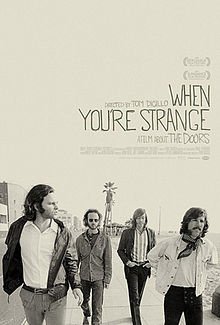
Two things strike you immediately about this much vaunted and Grammy award-winning doco: That Jim Morrison was a man of brooding good looks except when he smiled and then he looked just plain goofy (and there is a lot of him smiling and laughing in the early footage here); and that the script which Johnny Depp reads in a tired monotone seems to have been written by a 12-year old who has relied on an entry in The Little Golden Book of Rock Music. It is clipped, often portentous, biographical cliche.
By the end there may be a third impression also, that despite this being a film about "the Doors" it is, as with most films and books about them, in fact increasingly focused on Morrison.
There is a reason for that. The guy was a major screw-up whose ego, addled by alcoholism, effectively killed the band before they began to realise their full potential. Their debut album in '67 was exceptional -- and it was an exceptional year for debut albums - but thereafter it was a struggle to keep Jim's eye on whatever prize was out there.
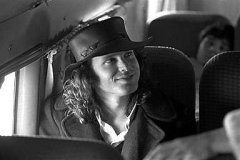 Morrison was a self-mythologiser who fancied himself as a poet (on scant evidence), and while it was understandable he was increasingly uncomfortable as an adult in an adolescent's world, he wasn't the first rock star to experience that. Most others rose past it, Morrison went down with it.
Morrison was a self-mythologiser who fancied himself as a poet (on scant evidence), and while it was understandable he was increasingly uncomfortable as an adult in an adolescent's world, he wasn't the first rock star to experience that. Most others rose past it, Morrison went down with it.
As is noted, people went to Doors concerts not for the music but to watch Jim screw up. And rather too often he did exctly that.
It is when this starts happenng -- about mid '68 -- you wish this doco turned the attention onto the other Doors (after all guitarist Robbie Krieger was writing the hit songs, and Ray Manzarek's organ playing and John Densmore's drumming were pivotal to the band's distinctive sound).
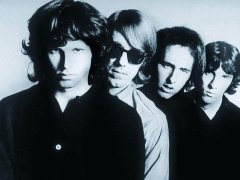 But unfortunately the familiar story arc here is that of Behind the Music -- without the Oprah/rehab redemption.
But unfortunately the familiar story arc here is that of Behind the Music -- without the Oprah/rehab redemption.
So why did this win a Grammy for best long form music video (not music doco, you note)?
My guess is because there is a lot of previously unseen footage (concerts, traveling, backstage, in the studio, informal with friends) and where that wasn't available the narrative uses stills which efectively evoke that period/incident.
It also has the advantage over other such rock docos (like the Chrome Dreams series, which is interesting for other reasons) in that it uses the original music.
The surviving Doors were clearly supportive of this project -- so it is in their best interest to say how great it is -- but you do wonder if they didn't feel some slight discomfort at being marginalised in their own story. Still, after Oliver Stone's free-wheeling psychedelic take (which isn't as bad as many insist, it's a Doors' novel not the non-fiction version) they seem glad to reclaim the ground.
But you do wish they had participated rather than step back and let the story be told in a neutral way. It would have ben fascinating to know just how they felt -- if they were ever going to say -- when they could see their potential being lost with every suck on a bottle by Jim, whom they relied on so much. What was their thinking when they employed professional drinkers to be Jim's minders-cum-boozing buddies to control him (whom he outdrank), and how did they feel about all those lost weeks then months when studio sessions were such a write-off?
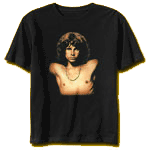 But maybe -- given the mixed reception to their subsequent Morrisonless output -- they don't want to further taint the brand . . . and you suspect this film was made for those who came into the story long after Jim had moved on.
But maybe -- given the mixed reception to their subsequent Morrisonless output -- they don't want to further taint the brand . . . and you suspect this film was made for those who came into the story long after Jim had moved on.
But this doco is far from completely disappointing.
In fact around the midpoint -- when things start to go wrong for Jim -- it really hits a pace and there is excellent footage and coverage of that pivotal concert in Miami which turned into a riot and a court case.. Thereafter the social context -- political assassinations, killings at Kent State, the Manson murders, rallies for decency, the war in Vietnam -- become more prominent and the Doors are placed firmly within the context of an America spinning out of control.
The Isle of Wight footage and that of Jim in Paris are also interesting (if brief) and throughout there are scenes from short films Morrison made (segments of which look alarmingly similar to Stone's much maligned film).
And in the extra footage Morrison's father (who Jim was largely estranged from) and his sister say what a fine young man he was.
The Doors lasted just 54 months, sold in excess of 80 million albums and sales still tick along at a million a year apparently. Then there are the t-shirts and posters.
They are still quite some story and although this doco doesn't dig as deep as it might have, the pictures often do convey much of the heroics, madness, sadness, frustration and decline.
Interested in more rock and Elsewhere music docos, then have a prowl through here.

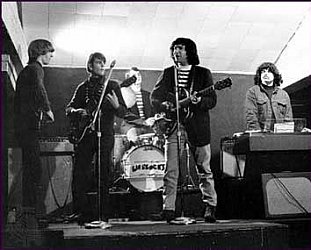

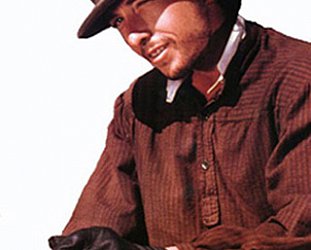

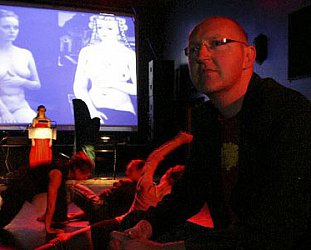

post a comment